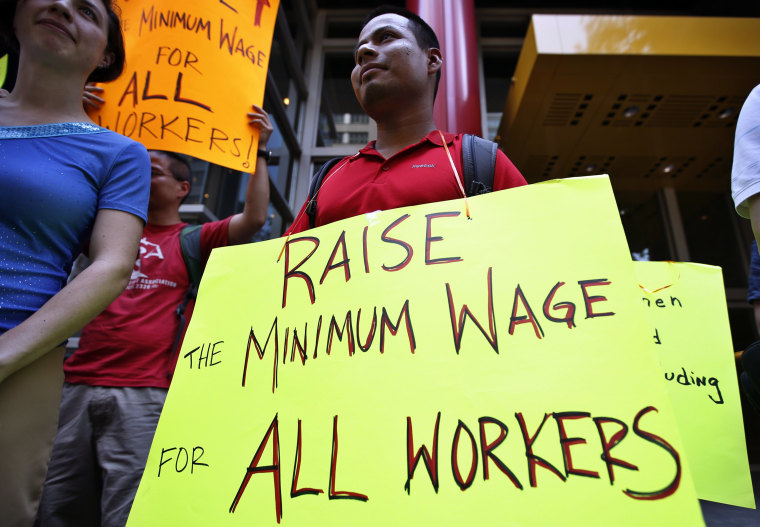The American minimum wage turned 75 this Tuesday, giving the Obama administration yet another reason to push for a boost. Vice President Joe Biden made the pitch in a White House address, flanked by minimum wage workers.
"It's time to raise the minimum wage and keep faith with the Fair Labor Standards Act," he said, referring to the 1938 legislation which originally introduced the federal minimum wage, among other labor protections.
President Obama proposed raising the federal minimum wage from $7.25 to $9.00 per hour in his 2013 State of the Union, where he also said any further wage increases should be automatically tied to increases in the cost of living. Democrats in the House and Senate subsequently introduced the Fair Minimum Wage Act of 2013, which would raise the minimum wage to $10.10 per hour and also peg it to the consumer price index.
In his speech, Biden said that workers were only asking that employers "just pay me for minimum wage what you paid in 1968," when the minimum wage was $10.58 in 2012 dollars. Had the minimum wage kept up with productivity increases in the American economy since 1968, it would now be worth $21.72 an hour [PDF].
While there hasn't been an organized push to raise the minimum wage that high, low-wage workers in various cities across the country have been agitating for a wage floor significantly higher than the ones proposed by either the White House or congressional Democrats. Low-wage fast food workers in cities like New York, Detroit, Chicago, Milwaukee and Seattle have demanded to be paid at least $15 per hour, and in at least some of those cities they have proposed the wage be raised through legislative means. Venture capitalist Nick Hanauer has also publicly called for a $15 minimum wage.
In his White House speech, Biden didn't just propose increasing the minimum wage: He also said the White House would act unilaterally to extend wage laws to industries that have typically been exempted.
"As the home care business has changed over the years, the law hasn't kept up," he said. Home health care professionals are legally exempt from the minimum wage, but Biden told reporters that "this administration is now working to finalize the rule" that will mandate a wage floor for the industry.
Nothing that the majority of workers in home health care are women, Biden framed the issue in feminist terms.
"It's about time we stop treating work in fields where women are the majority as less valuable than in male-dominated fields," he said. The same applies, he said, to tipped service labor, another sector which employs mostly women. The federal base minimum wage for tipped labor is currently $2.13, provided that employees make enough in tips to bring them up to the hourly rate of $7.25.
Before Biden spoke, acting Labor Secretary Seth Harris held an on-stage discussion with National Bureau of Economic Research associate Alan Kreuger, National Economic Council director Gene Sperling, and a group of five low-wage workers.
"I am at the point that earning a living wage has become a new American Dream for me," said Pattie Federico, a theater employee in Boston, Mass. "My quality of life is so low that I can't even enjoy the simple things like reading a book because of anxiety over finances."
